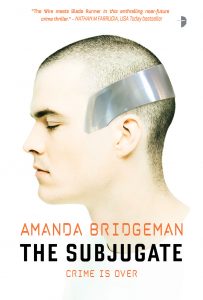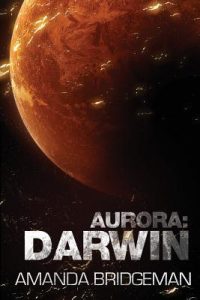The Sadness and Sacrifice of Sci-Fi Heroines: GUEST POST by Amanda Bridgeman
Today, we’re thrilled to welcome back sci-fi author Amanda Bridgeman to the Hive.
Amanda’s most recent novel, The Sensation, is the much-anticipated sequel to the sci-fi murder-mystery The Subjugate. Both are currently available from Angry Robot Books:
A series of brutal murders has the homicide division of San Francisco’s Hub 9 working overtime. But as the bodies mount, they begin to question whether the attacks are random or somehow connected.
When one of their own falls victim, Detective Salvi Brentt and the Hub 9 homicide team join forces with the narcotics and cyber divisions to track down those responsible. They soon discover a volatile new drug-tech experience, involving black market neural implants, has hit the streets, causing the epidemic of violence and missing persons.
With the clock ticking and the bodies piling up, Salvi must go deep undercover in the seedy Sensation club scene to found out who is behind it. But in the secretive playgrounds of the rich and powerful, some will stop at nothing to protect their empire…
File Under: Science Fiction [ Electrical High – Rich vs All – Deathly Addiction – If You Go Down to the Woods… ]
Can a sci-fi heroine save the world *and* live happily ever after?
If we’re talking the SF Romance genre, then yes, the ‘Happily Ever After’ (HEA) or ‘Happy For Now’ (HFN) is a requirement of that genre and readers/viewers expect this. But what about heroines in straight Science Fiction stories? Looking back at some of my favourite screen SF heroines, I realised that many are actually denied their HEA/HFN. Instead, their reward for saving the world is that they are doomed to a life of sacrifice and sadness.
Take my favourite SF heroine of all time, Ellen Ripley (Alien). This is a woman who knew better but whom no-one listened to. She told them not to bring the alien creature onto the ship, but they did. The result, she was forced to fight for her life and became the sole survivor of that ship. Was survival her reward? No, that was just natural selection, a by-product of her intelligence and resilience. Her reward, or curse as it turns out, was to float in space for decades so that she outlived her only child, daughter Amanda. Ripley saved the day by killing the deadly alien, and her reward was to have motherhood stripped away from her.
 In Aliens, after she battles similar foes (both human and alien), finally a light at the end of the tunnel for our Ripley. The chance to save Noot, an orphan who would offer her a second chance at motherhood, and Hicks, a chance at love. But does she get her HEA/HFN? No. She makes it through another ordeal only to have them both taken from her at the start of Alien 3. Once again, she is denied motherhood, and to add insult to injury, she is also denied love.
In Aliens, after she battles similar foes (both human and alien), finally a light at the end of the tunnel for our Ripley. The chance to save Noot, an orphan who would offer her a second chance at motherhood, and Hicks, a chance at love. But does she get her HEA/HFN? No. She makes it through another ordeal only to have them both taken from her at the start of Alien 3. Once again, she is denied motherhood, and to add insult to injury, she is also denied love.
In a similar vein, we can look at Louisa Banks in Arrival. She is the key to communicating with the alien creatures and averting a war, and her reward? The loss of motherhood and the loss of love. Louisa is another SF heroine, like many, who saves the day and is somehow punished for it.
Now Sarah Connor in Terminator 2, does get to keep her child, though she is separated from him for many years, and when she does get him back, she has to fight tooth and nail every day to keep him alive. But love? Nope. Her role of mother and protector is deemed far too important. By keeping her son alive she gives the future world a hope, but she will be doomed to a life of loneliness for it.
So, themes of loss and denial when it comes to love and motherhood are strong with my favourite SF heroines, and so too are themes of repentance and redemption.
Imperator Furiosa (Mad Max: Fury Road) is a good example of this. She goes to great lengths to protect the wives of Immortan Joe, the need for repentance/redemption her driving force. And after teaming up with Max and creating a new life, a new world for the people of the Citadel, could her reward be a HEA/HFN? Nope. Now, look, maybe it was my wishful thinking, but I saw the way she and Max looked at each other. So why couldn’t Max hang around? Because Furiosa, apparently, hadn’t finished her repentance. She was doomed to a live a lonely life without love/lust, like so many great SF heroines.
Sacrificing love and motherhood is one thing, but what about the SF heroines who sacrifice their actual lives? Carolyn Fry in Pitch Black must repent for wanting to sacrifice lives when her ship is in distress at the start of the film. Her redemption? To give her life so that others can survive. Among them, a child. Through the film she ends up taking on a motherly role with this child, so her death is very symbolic of a mother’s sacrifice.
Jyn Erso in Rogue One: A Star Wars Story (though technically this is SFF and not SF), is another who gives the ultimate sacrifice – her life – essentially seeking redemption for her father’s mistake. And sticking with the SFF genre, we can add Natasha ‘Black Widow’ Romanov (The Avengers), who also sacrificed her life (and her chance of a HEA with Banner) for the greater good – the mission at large, but also to give Hawkeye his family back. The childless woman dies for the sake of the family man.
And then there’s Kara Thrace, a.k.a. Starbuck in Battlestar Galactica. Throughout the series she saves countless lives and proves herself a hero (reckless as she sometimes was) time and again, and in return? She’s denied even being human.
 So why have some of my favourite SF heroines been denied their HEA/HFN? More often than not a hero will save the day *and* get the girl, but for some reason the heroine is less likely to meet the same fate. Is this because we think falling in love or motherhood makes them weak and somehow less heroic? Do emotional ties made it hard for them to be seen as the heroes they need to be?
So why have some of my favourite SF heroines been denied their HEA/HFN? More often than not a hero will save the day *and* get the girl, but for some reason the heroine is less likely to meet the same fate. Is this because we think falling in love or motherhood makes them weak and somehow less heroic? Do emotional ties made it hard for them to be seen as the heroes they need to be?
I have to admit, writing the heroine in my Aurora series, Carrie Welles, has been tough at times because over the course of the seven books she has given birth to three children. And it is hard to have a world-saving heroine with kids in tow. I find my way around this by giving her Sentinels, special bodyguards who watch over her children 24/7. The children are, after all, the only First Gen Alphas (bio-engineered future soldiers) in existence, so it makes sense the invested military organization would want to keep an eye on their ‘product’. It works story-wise and allows me as a writer to have my heroine experience motherhood *and* be able to leave the children from time to time to save the world too.
And what of love? I feel quite strongly that after my kick-ass heroines have saved the day and amassed a collection of scars – whether it’s Sergeant Carrie Welles in the Aurora series or Detective Salvi Brentt in the Salvation series – that they deserve to find happiness like any hero would. I don’t think having them fall in love/lust makes them weak. I think it makes them human. Carrie Welles and Salvi Brentt are strong independent women but I don’t want them condemned to a life of loneliness like Ripley or Connor or Furiosa because of that. My SF heroines will fight hard and go through some dark times in order to save the day, but on the other side of that, I want to give them the rewards they deserve. And they deserve to find their HEA/HFN.
What do you think? Do you prefer your SF heroines to suffer the sadness and loneliness that seems to come with the territory? Does it make them tougher somehow? Or would you like to see your heroine offered the same rewards as the hero often gets?
Thank you so much Amanda Bridgeman for joining us for Women In SFF!
If you wanted to know more about Amanda’s SALVI BRENTT series, you can find the novels on the Angry Robot website:
AMANDA BRIDGEMAN is a Tin Duck Award winner, an Aurealis and Ditmar Awards finalist and author of several science fiction novels, including the best-selling space opera/military SF Aurora series, alien contact drama The Time of the Stripes, and sci-fi crime thriller The Subjugate. The Subjugate is being developed for TV by Anonymous Content (True Detective, Mr Robot, The Alienist) and Aquarius Films (Lion, Berlin Syndrome, Dirt Music). Born in the seaside town of Geraldton, Western Australia, she moved to Perth to study film & television/creative writing at Murdoch University, earning her a BA in Communication Studies. Perth has been her home ever since.
